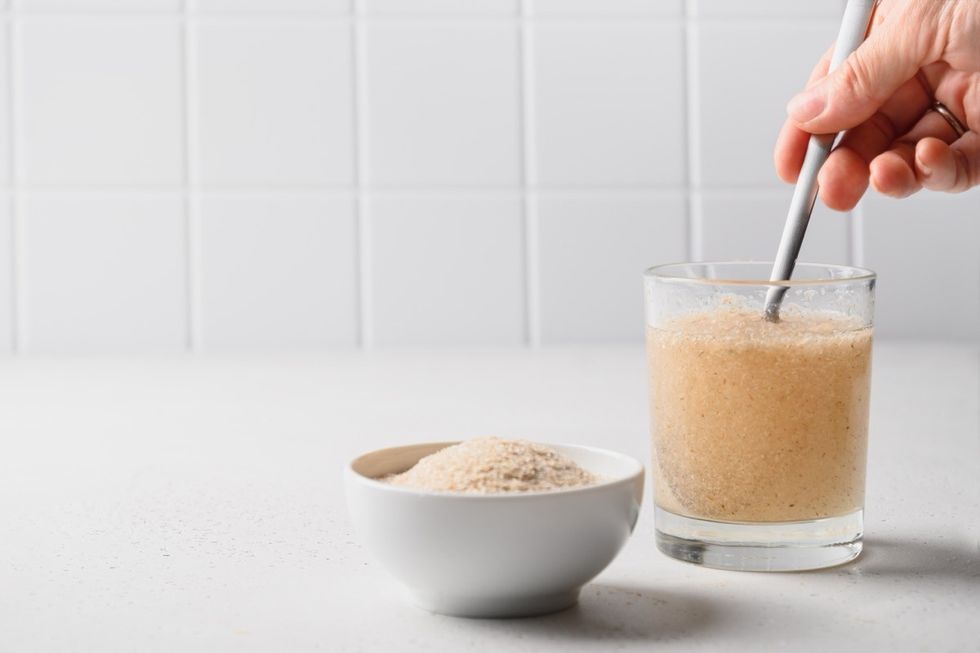Weight loss fads come and go, oftentimes with little staying power. Yet, with one in eight adults having tried GLP-1 inhibitor medications such as Ozempic and Mounjaro, it’s no surprise that they continue to dominate the weight loss and wellness conversation. Ozempic is approved by the U.S. Food and Drug Administration (FDA) as a type 2 diabetes medication, but it’s often prescribed off-label as a weight-loss aid. According to Columbia University’s Center for Metabolic and Weight Loss Surgery, it typically produces a total weight loss of 15 to 20 percent of the patient’s body weight. But while it might be effective, it’s not an option for everyone, which leads some to explore other avenues. One of the latest alternatives making waves is psyllium husk.
RELATED: 9 Reasons You Should Avoid Ozempic If You’re Over 65, Doctors Say.
There are plenty of reasons that you might decide against taking Ozempic. Product shortages, astronomically high price tags, restrictions to qualify for prescription, and severe side effects are just some of the obstacles that could be standing in your way. With this in mind, there are other products that promise weight loss without crushing monthly fees, a long wait at the doctor’s office, or potential health risks. In particular, the fiber supplement psyllium husk has emerged as a popular substitute, often being called “the new Ozempic.”
PamelaPeeke, MD, MPH, FACP, FACSM, a physician and the head of the Solaray Science Advisory Board, says that research does, in fact, indicate that soluble fiber sources, including psyllium husk, can help people lose weight and control their belly fat.
“According to some studies, psyllium fiber specifically may support healthy weight and body composition as part of a healthy diet,” Peeke tells BestLife. “Some randomized controlled studies have shown that psyllium facilitates weight loss in overweight and obese participants.”
However, Peeke says it’s important to understand that psyllium and Ozempic work by different mechanisms of action: While Ozempic targets the appetite centers in the brain and reduces “food noise”—those persistent, intrusive thoughts about food and eating—psyllium targets the gastrointestinal tract, creating a sense of fullness that decreases appetite.
“It’s thought that soluble fibers, including psyllium, help slow down how fast the stomach releases digested food. As the fibers absorb water, a person perceives a sense of fullness,” Peeke explains.
ChrisMohr, PhD, RD, a Fitness and Nutrition Advisor for Fortune Recommends Health, further explains that as psyllium absorbs water and expands, it creates a gel-like mass that promotes a feeling of satiety.
RELATED: Ozempic Is Not the Most Effective Drug for Weight Loss, New Study Says.
“Psyllium husk swells in your stomach, which makes you feel full. Imagine a dry sponge that’s dunked in water; it would swell until it no longer could hold that water. That’s essentially how psyllium works, in a very rudimentary way,” Mohr tells Best Life.
He continues, “As a soluble fiber, it forms a viscous compound in your intestines that slows down the digestion and absorption of food. This delay helps control your hunger and prevents overeating, supporting a gradual approach to losing weight and the added fiber can also have a very positive effect on overall health outcomes.”
The experts agree that while psyllium husk may aid in weight loss, you shouldn’t expect it to single-handedly shift the scale in your favor. It’s important to treat it as just one part of the puzzle while still emphasizing a balanced diet and exercise.
Still, many people might benefit from a fiber supplement—and from incorporating more dietary fiber into their meals.
“I consider fiber a superfood, and many people aren’t getting enough,” says Peeke. “If you’re not eating enough varied, fiber-rich foods and want to support your weight loss efforts, a psyllium husk supplement may be a good addition to a healthy diet and overall wellness routine.”
Mohr notes that as a “gentler, natural alternative” to Ozempic, psyllium husk is generally considered safe for most people to take but offers a few caveats.
“It’s important to drink plenty of water with psyllium husk to avoid it becoming too thick, which could block your throat or intestines. Some people may experience bloating, gas, or discomfort when they first start taking it due to the increased fiber intake,” Mohr says.
He adds that if you have pre-existing intestinal problems or are taking certain medications, it’s wise to talk to a doctor before adding psyllium husk to your diet.
“It’s best to start with a lower amount and add as needed instead of going from 0 to 100 with this or any other ingredient or product,” Mohr suggests.

